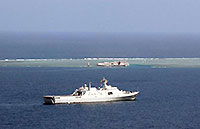EU restates position on Brexit talks
(China Daily UK) Updated: 2016-09-15 18:24Unlimited access to the internal market is dependent on free access for persons and goods
European Union chief executive Jean-Claude Juncker warned London again on Wednesday that the UK will not get access to Europe's single market if it bars some EU citizens from working in Britain after Brexit.
"There can be no a la carte access to the single market," the European Commission president told the European Parliament during his annual State of the Union address. "Only those can have unlimited access to the internal market who accept that there will be free access for persons and goods."
The point has been made repeatedly by Brussels as it waits for British Prime Minister Theresa May to launch the formal process of negotiation for the UK to leave the European Union.
The British government wants to retain trade access on the best terms with the EU but, following the June referendum, says free immigration from the EU must end.
On Tuesday, the same point was made by Guy Verhofstadt, the parliament's Brexit negotiator. He said the four European freedoms-freedom of movement for goods, services, capital and labor-were indivisible and Britain could not have one without the others.
During Wednesday's debate, Verhofstadt said the European Union should treat the negotiations with Britain as an occasion to make progress, rather than take retribution.
"Brexit is not a liability. I see it more as an opportunity," he said. "Our duty, our responsibility is to make Brexit a success for Europe, for all citizens of Europe."
Verhofstadt addressed British eurosceptic members of the European parliament who described him as an anti-British "fanatic" in his pursuit of a more closely integrated EU, saying: "Brexit is not a matter of punishment, it's not a matter of revenge."
Junker said in his speech that the EU must do more in the field of defense, starting with the creation of an EU military headquarters and start working toward establishing a common military force. He insisted the bloc's economic and cultural influence was not enough to safeguard its place in today's uncertain world and said the 28-nation organization "should be stronger" militarily.
"Together, we have to make sure that we protect our interests," Juncker explained.
He stressed that the bloc's actions should take place in concert with the US-led NATO defense alliance, to which 22 EU member states also belong.
"More European defense in Europe doesn't mean less trans-Atlantic solidarity," Juncker added.
- Despite big deals, data shows activity slowed after Brexit
- Ending his political career, Britain's ex-leader Cameron resigns as a lawmaker
- EU leader urges Britain to start Brexit "as soon as possible"
- No 'running commentary' on Brexit negotiations: British PM
- British parliament to debate second Brexit referendum petition







